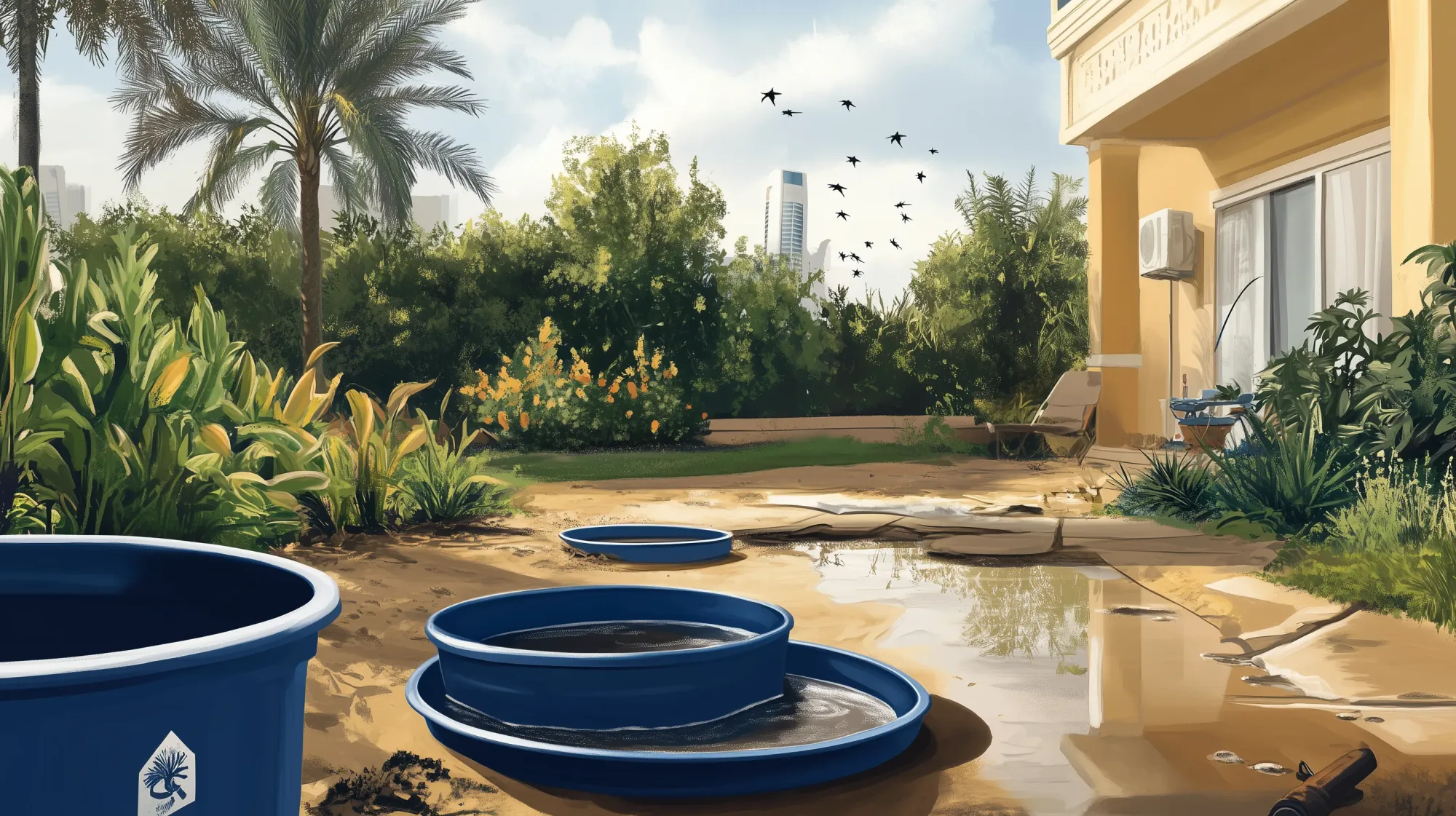Mosquito Control in Dubai: Stop the Autumn Breeding Cycle

You've waited six months to enjoy your garden without sweating through your clothes. Finally, October arrives with perfect evening weather. You set up outdoor dining, light some candles, and settle in for a lovely meal under the stars.
Within minutes, you're being bitten repeatedly.
By the time you retreat indoors, you've got itchy welts on your arms and legs. Your pleasant outdoor evening is ruined.
Here's what catches most Dubai residents by surprise: mosquitoes aren't a summer problem. They're an autumn and winter problem. While you assumed mosquitoes would be terrible during the hottest months, they were actually relatively quiet when temperatures exceeded 40°C.
Now that October's pleasant 25-30°C weather has arrived, mosquitoes are breeding like crazy and actively feeding during exactly the times you want to be outside - early mornings and evenings.
The really frustrating part?
The same things you're doing to revive your garden after summer are creating perfect mosquito breeding grounds:
- Watering those struggling plants heavily
- Filling pot saucers to help them recover
- Irrigating your brown lawn back to green
- Creating standing water everywhere
Understanding how mosquitoes operate in Dubai's unique climate and taking targeted action right now can mean the difference between enjoying your outdoor spaces through winter or spending the next few months being eaten alive.
Why Autumn and Winter Are Dubai's Peak Mosquito Seasons
Most people arrive in Dubai assuming mosquitoes follow the same patterns they knew from home - worse in summer, gone in winter. Dubai's climate turns this completely upside down.
During the hottest summer months, when temperatures regularly exceed 45°C, mosquitoes struggle with extreme heat just like everything else. They're not breeding actively, they're not particularly aggressive, and you're not outside during their preferred feeding times anyway.
October changes everything.
Temperatures drop to that perfect range where mosquitoes thrive. The same weather that makes outdoor living pleasant again creates ideal breeding conditions. Female mosquitoes need standing water to lay eggs, and suddenly, water is everywhere in Dubai gardens.
The breeding cycle moves quickly in warm weather:
- Mosquitoes can go from egg to biting adult in just seven to ten days
- Standing water you ignored last week produces new generations this week
- By the time you notice significant activity, multiple generations have already bred
- The population expands exponentially
Villa residents face the biggest mosquito challenges because gardens offer countless breeding opportunities. But apartment dwellers aren't immune - balcony plant pots, outdoor water features, even roof access areas can harbor mosquito breeding.
The key difference is volume.
A villa garden with multiple breeding sites can produce hundreds or thousands of mosquitoes, while an apartment balcony might produce dozens. Both are unpleasant, but scale matters.
The Breeding Ground Audit: Where Mosquitoes Are Multiplying Right Now
The most effective mosquito control starts with eliminating breeding sites. Adult mosquitoes you see buzzing around are irritating, but they're symptoms of the real problem - standing water where new generations are developing.
Walk your outdoor areas right now with a critical eye for any water that's been sitting for more than a few days.
Pot plant saucers and trays are probably your biggest breeding ground culprit. If you're watering heavily to revive plants after summer, those saucers catch and hold water perfectly for mosquito larvae:
- Empty them completely at least twice per week
- Better yet, remove saucers entirely during autumn and winter
- The minor inconvenience of water draining onto your patio is far preferable to breeding mosquitoes
Garden low spots and drainage issues become obvious when you start irrigating regularly. Any depression where water pools and sits for days is a breeding site:
- Walk your garden after watering or rain
- Identify spots where water accumulates
- Either improve drainage or fill these areas so water doesn't collect
Blocked drains and gutters hold standing water that's protected from sun and wind, creating an ideal breeding habitat. Clear all drains and ensure water flows freely rather than sitting. Check gutters if you have them - accumulated debris can create perfect mosquito nurseries.
AC condensation collection is often overlooked. The water that drips from outdoor AC units sometimes pools if drainage isn't quite right. Check around every outdoor AC unit and ensure condensation drains away rather than collecting. This water source is constantly replenished, making it particularly attractive to mosquitoes.
Forgotten containers and outdoor items are breeding grounds you don't realize exist:
- That bucket left in the corner of your garden
- Old plant pots stacked outside
- Children's toys left outdoors
- Building materials or bits of debris
- Anything that can hold even small amounts of water
Do a thorough outdoor clear-out and either store items properly or ensure they can't collect water.
Pools and water features can breed mosquitoes if not properly maintained:
- Pools need proper chlorination and circulation
- Water features need to be running, not stagnant
- Even decorative ponds need treatment or fish that eat mosquito larvae
- Standing, untreated water is always a breeding site
The challenge with mosquito breeding sites is that they're everywhere once you start looking. A bottle cap holding a teaspoon of water can breed mosquitoes. A fold in a tarp collects rainwater. The bottom of a wheelie bin that holds a bit of water.
Mosquitoes need remarkably little water to breed successfully, so your audit needs to be thorough.
Natural Mosquito Repellents: Plants and Home Remedies
While eliminating breeding grounds is the most effective control method, several natural approaches can help reduce mosquito activity around outdoor living areas. These won't solve a major mosquito problem on their own, but they're useful supplementary measures.
Citronella grass (Cymbopogon) is probably the most well-known mosquito-repelling plant. This is what citronella candles are made from:
- Plant around outdoor seating areas, patios, or anywhere you spend time outdoors
- Reasonably hardy in Dubai's climate if given adequate water
- Tolerates both sun and partial shade
- Lemon-scented leaves can be crushed and rubbed on skin for mild repellent effect
Lavender is both beautiful and genuinely disliked by mosquitoes. The strong scent that humans find pleasant is repellent to many insects. Lavender can be challenging in Dubai's summer heat, but thrives during autumn and winter months when mosquitoes are most active. The bonus is that lavender attracts beneficial pollinators while repelling pest insects.
Basil does double duty as a cooking herb and mosquito deterrent:
- Strong aroma is unpleasant to mosquitoes
- Grows reasonably well in Dubai during cooler months
- Keep pots on outdoor dining tables or near seating areas
- Crush fresh leaves and rub on skin for mild repellent effects
Mint (including peppermint and spearmint) is strongly aromatic, and mosquitoes avoid it. Mint grows enthusiastically in Dubai gardens - sometimes too enthusiastically, so consider containing it in pots rather than planting directly in beds where it can become invasive.
Rosemary is a woody herb that thrives in Dubai's climate and naturally repels mosquitoes with its strong scent:
- Use as a landscape plant around patios and outdoor living spaces
- When cooking outdoors, throw rosemary sprigs on the barbecue
- Creates smoke that's unpleasant to mosquitoes
- Actually, one of the more effective plant-based deterrents
Marigolds contain pyrethrum, a compound used in many insect repellents. The distinctive smell deters mosquitoes and other insects. Marigolds are relatively easy to grow in Dubai during cooler months and add bright color to gardens.
Lemongrass is closely related to citronella and has similar mosquito-repelling properties. It grows well in Dubai with adequate water and creates attractive, architectural clumps. The fresh stalks are also useful in cooking, so lemongrass serves multiple purposes in a Dubai garden.
Catnip is surprisingly effective at repelling mosquitoes - studies suggest it's actually more effective than some commercial repellents. It grows readily in Dubai gardens during cooler months. The downside is that if you have cats in the neighborhood, they'll be very interested in your garden.
Essential oil spray mixtures can provide temporary relief around outdoor areas:
- Mix water with a few drops of citronella, eucalyptus, lavender, peppermint, or lemongrass
- Spray around outdoor seating areas, on outdoor furniture, and around door and window frames
- Doesn't provide the same protection as commercial repellents
- Does help reduce mosquito activity in treated areas for short periods
Natural repellent candles and torches using citronella, lemongrass, or eucalyptus oils create a small zone of protection around outdoor dining areas. They're not foolproof - if mosquito pressure is high, they won't keep you completely bite-free - but they do reduce activity.
The honest reality?
Natural repellents work best as part of a comprehensive approach. If you've eliminated breeding grounds, installed fly screens, and timed outdoor activities appropriately, natural repellents can make outdoor spaces more comfortable. If you've got massive mosquito breeding happening in your garden and you're relying solely on a few plants to protect you, you'll be disappointed with the results.
Villa-Specific Mosquito Challenges
Villa properties face mosquito challenges that apartments simply don't deal with. The direct ground-level access, extensive outdoor areas, and garden irrigation create multiple opportunities for mosquito breeding.
Garden irrigation systems can create breeding sites if not properly designed and maintained:
- Low-pressure areas where water pools
- Irrigation heads that leak slightly and create constant puddles
- Overspray that hits walls or structures and drips into collecting areas
- Adjust irrigation timing and coverage to minimize standing water
- Run irrigation early morning so excess water evaporates during the day
Outdoor storage areas in villas often accumulate items that collect water. Garden sheds, behind air conditioning units, areas alongside the house where things get stored and forgotten - these spaces need regular inspection. Everything stored outdoors should either be under cover where it won't collect water or positioned so it can't hold water.
Garden maintenance becomes critical for mosquito control:
- Overgrown vegetation creates shady, protected areas where mosquitoes rest
- Thick ground cover can hide standing water
- Regular garden clearing eliminates protected harbourage areas
- Makes it harder for adult mosquitoes to survive, even if some breeding occurs
Swimming pools require consistent maintenance from a mosquito control perspective. Proper chlorination prevents mosquito breeding, but pools that aren't maintained consistently can become massive breeding sites. Even a few days of inadequate chlorination allows mosquito larvae to develop.
Pool covers that collect water on top are also breeding sites.
Villa compounds and communities face collective mosquito issues. Your neighbor's poorly maintained garden or pool becomes your mosquito problem because adult mosquitoes easily fly between properties. Community-wide pest control is more effective than individual villa treatment in these situations, though getting entire compounds to coordinate isn't always feasible.
Apartment and Balcony Mosquito Control
Apartment dwellers face different but still significant mosquito challenges. Balcony plant pots and decorative containers are the primary breeding concern:
- Those attractive ceramic pots with attached saucers are perfect mosquito nurseries
- Either drill drainage holes in saucers so water can't collect
- Remove saucers entirely
- Empty them completely at least twice weekly
Balcony drainage needs checking. Some balconies have drains that don't quite drain properly, leaving small puddles that breed mosquitoes. If you notice standing water after rain or after you've watered plants, address the drainage issue or make sure to sweep water off the balcony rather than letting it sit.
Building-wide mosquito issues affect all residents:
- Rooftop areas with poor drainage
- Water tanks that aren't properly sealed
- Basement or ground floor areas with standing water
- These building-level problems create mosquitoes that affect everyone
If you're experiencing significant mosquito issues despite managing your own balcony properly, raise the concern with building management. Building-wide treatment is sometimes necessary.
Lower-floor apartments typically experience more mosquito pressure than higher floors simply because mosquitoes generally stay closer to ground level, where breeding sites exist. If you're in a ground-floor or first-floor apartment, you're dealing with mosquitoes breeding in the building's landscaping and outdoor areas.
Shared building outdoor areas like gardens, pools, and recreational spaces need proper maintenance from a mosquito perspective. You can't control these spaces individually, but you can advocate for proper maintenance through building management or residents' associations.

When Professional Mosquito Control Becomes Necessary
Despite your best efforts at eliminating breeding grounds and using natural repellents, sometimes professional mosquito control is necessary.
Several situations indicate it's time to call experts:
If you've conducted thorough breeding ground elimination but mosquito activity remains high, there are breeding sites you haven't found or can't access. Professional pest control can identify hidden breeding areas and treat them with larvicides that kill mosquito larvae before they become biting adults.
When mosquito populations are already established and high, adult mosquito treatment becomes necessary alongside breeding site elimination. Professionals can fog outdoor areas to knock down adult populations while also treating breeding sites. This two-pronged approach quickly reduces mosquito activity to manageable levels.
Large properties or properties with extensive landscaping benefit from professional treatment because the scale is simply too large for effective individual management. Professionals have equipment and products that can treat large areas efficiently.
If neighbors aren't managing their properties and you're dealing with mosquitoes breeding elsewhere but feeding on your property, professional barrier treatment around your outdoor areas creates a protective zone, even though you can't address the source. Professional Treatment Costs
Professional mosquito control for villas typically costs AED 300-600 for comprehensive treatment, including:
- Breeding site inspection
- Larvicide application
- Adult mosquito control
For severe infestations or large properties, costs can reach AED 800-1,000. Many homeowners find that one professional treatment in early October, combined with diligent breeding ground elimination, provides protection through the entire autumn and winter season.
Apartment mosquito treatment focuses on balcony areas and any accessible breeding sites, usually costing AED 200-400 depending on size and scope. Building-wide treatment coordinated through management is typically more cost-effective than individual apartment treatments.
Timing Outdoor Activities to Avoid Peak Mosquito Hours
Even with good mosquito control, understanding when mosquitoes are most active helps you plan outdoor time strategically. Mosquitoes are crepuscular, meaning they're most active during dawn and dusk when light levels are low and humidity is higher.
Early morning, from sunrise until about two hours after, is peak feeding time. If you're having morning coffee on your terrace at 6:30am, you're sitting outside exactly when mosquitoes are hungriest. Either accept you'll need repellent or wait until mid-morning when mosquito activity drops significantly.
Evening, from about two hours before sunset until an hour or two after, is the second peak feeding period. That perfect 7pm outdoor dinner timing when the weather is lovely is also prime mosquito time:
- Light citronella candles
- Use fans to create airflow around seating areas
- Apply repellent
- All help make evening outdoor time more comfortable
Midday outdoor time involves fewer mosquitoes simply because they're resting in shaded areas during the heat and bright light. If you must be in your garden working or doing maintenance, midday is when you'll encounter the least mosquito activity.
Wind affects mosquito activity dramatically. Even a light breeze makes it difficult for mosquitoes to fly and feed effectively. Portable outdoor fans positioned around seating areas create airflow that keeps mosquitoes from landing on people.
This is actually one of the most effective non-chemical mosquito deterrents for outdoor entertaining.
Long-Term Mosquito Management Through Dubai's Seasons
Effective mosquito control in Dubai requires understanding that this is an autumn and winter challenge, not summer. Start your mosquito offensive in October when breeding begins, maintain vigilance through winter months when mosquito activity continues, and relax efforts in spring when rising temperatures begin suppressing populations again.
The October-March period is when consistent effort matters:
- Weekly breeding ground checks
- Maintaining plants that repel mosquitoes
- Using screens and barriers
- Timing outdoor activities appropriately
These habits, maintained through cooler months, keep mosquito populations controlled.
Many homeowners make the mistake of thinking mosquito control is a one-time treatment. It's an ongoing process of eliminating breeding opportunities, monitoring for new problems, and maintaining barriers against mosquito activity.
The effort becomes routine quickly.
The payoff is being able to actually enjoy your outdoor spaces during Dubai's most pleasant weather months.

Protecting Your Outdoor Season from Mosquito Invasion
You've waited half a year to enjoy your garden and outdoor spaces. Don't let mosquitoes steal these months from you by taking over your garden with breeding populations.
The breeding ground audit takes perhaps an hour if you're thorough. Maintaining natural repellent plants is enjoyable gardening work that serves multiple purposes. Installing fly screens is a one-time investment that protects indefinitely.
Combined with professional treatment if needed and good timing of outdoor activities, you can reclaim your outdoor spaces from mosquito invasion.
Your autumn and winter evenings can be pleasant outdoor dining and relaxation rather than retreating indoors, covered in itchy bites.
Check Trusty connects Dubai homeowners with Dubai Municipality-certified pest control experts who specialize in mosquito control strategies that work in Dubai's unique climate. Whether you need comprehensive garden treatment, breeding site identification and elimination, or ongoing mosquito management through autumn and winter, verified experts understand the specific challenges Dubai's seasonal patterns create.
Ready to stop surrendering your garden to mosquitoes? Connect with Check Trusty's verified pest control professionals who can assess your property's mosquito breeding risks and establish the treatment strategy you need.
Your outdoor season is too precious to spend slapping mosquitoes and hiding indoors.
For comprehensive information about all seasonal pest challenges in Dubai, check out our complete guide to seasonal pest problems in Dubai.

